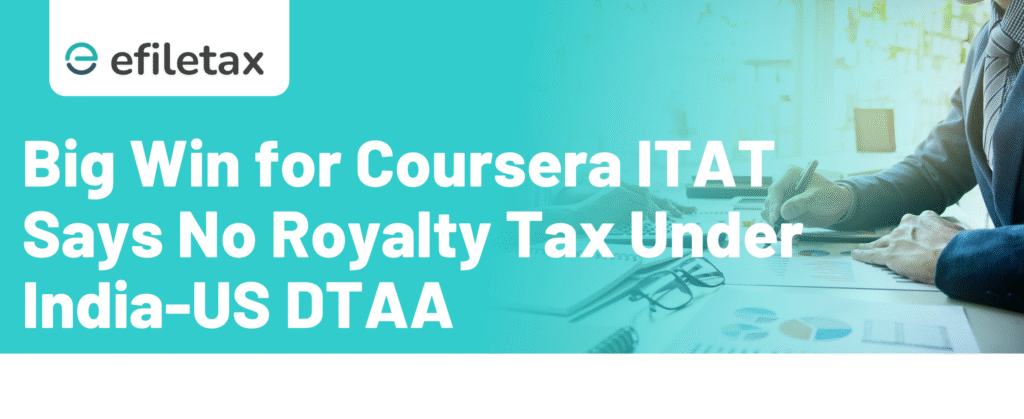
ITAT Relief for Coursera No Royalty or FTS Tax under India-US DTAA
In a landmark ruling for global edtech platforms, the Delhi bench of the Income Tax Appellate Tribunal (ITAT) has held that income earned by Coursera Inc., a US-based online learning platform, is not taxable in India as ‘royalty’ or ‘fees for technical services (FTS)’ under the India-USA Double Taxation Avoidance Agreement (DTAA).
This judgment sets a precedent for how foreign e-learning platforms are treated under Indian tax laws—particularly when they operate without a physical presence in India.
Background of the Case
- Entity: Coursera Inc., USA
- Assessment Year: 2018–19
- Dispute: Whether income earned from Indian users is taxable in India
- AO’s View: Income was either royalty or FTS under Section 9(1)(vi)/(vii) of the Income Tax Act
- Coursera’s Stand: No business connection or PE in India; income not taxable under DTAA
Key Findings by ITAT
1. No Royalty Character Under DTAA
- The ITAT held that course access through an online platform does not amount to use of copyright.
- Users are only accessing copyrighted content, not exploiting the copyright itself.
- Hence, not taxable as royalty under Article 12 of the India-USA DTAA.
2. No Technical Services Involved
- The services are automated, not human-intervened.
- As per Explanation to Section 9(1)(vii), FTS requires human effort or intervention.
- ITAT followed the Delhi HC ruling in Dynamic Vertical Software India (P) Ltd.
- Conclusion: No FTS element, hence not taxable.
3. No PE, No Business Connection
- Coursera has no server, office, or agent in India.
- Under Article 5 of India-US DTAA, a permanent establishment (PE) is necessary for business income to be taxed.
- Since no PE exists, business profits escape Indian taxation.
Legal References
- Income Tax Act, 1961: Section 9(1)(vi) & (vii)
- India-USA DTAA: Article 12 (Royalties & FTS), Article 5 (PE)
- CBDT Circular No. 5/2004: Clarifies automated services not taxable as FTS
- Case Law:
- Dynamic Vertical Software India (P) Ltd. v. DCIT
- Coursera Inc. v. DCIT – ITAT Delhi (AY 2018–19)
Why This Ruling Matters
This ITAT ruling gives much-needed clarity to foreign edtech, SaaS, and streaming platforms operating without Indian infrastructure:
- Sets a precedent on what qualifies as royalty or FTS
- Reinforces the importance of DTAA over domestic provisions
- May influence assessment of Netflix, Udemy, Duolingo, and others in India
Expert View: Practical Tip for Foreign Platforms
If you’re a foreign digital platform earning income from India, ensure:
- You have no server or dependent agent in India
- Services are fully automated and user-driven
- You maintain detailed access logs and contracts to prove no human intervention
➡️ This helps safeguard against wrongful classification as royalty or FTS.
Summary
Coursera gets tax relief in India as ITAT rules its income from Indian users is not royalty or FTS under the India-US DTAA, setting a precedent for foreign e-learning and digital platforms.
FAQs
Q1. Is Coursera’s income taxable in India?
No, as per ITAT Delhi, Coursera’s income is not taxable as royalty or FTS under India-US DTAA.
Q2. Does this ruling apply to other foreign platforms?
Yes, if they follow similar business models without PE or human-delivered services.
Q3. What if a foreign company has a server in India?
Then it may be considered as having a PE, and Indian tax may apply.
Final Thoughts
This case reiterates the importance of double taxation treaties and factual clarity in cross-border taxation cases. For tax consultants and edtech companies, this is a ruling to bookmark.